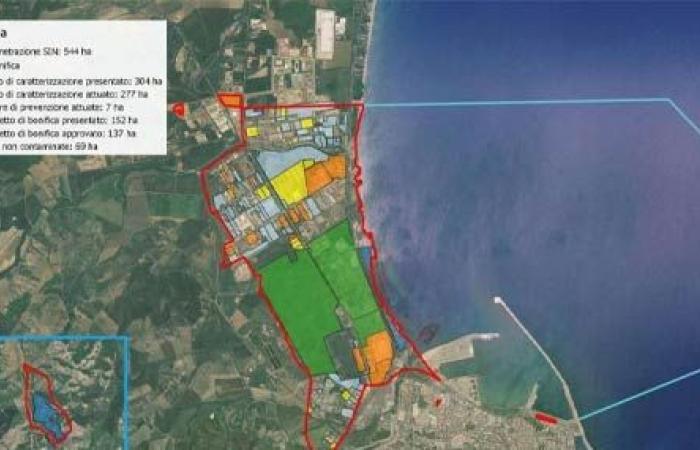Of STEFANO CIAFANI, ANNA PARRETTA AND ROSARIA VAZZANO – The rehabilitation of the Site of National Interest of Crotone, included in the National Reclamation Program with the Ministerial Decree of 26 November 2002, has experienced twenty years of unjustifiable delays which the Crotone community is no longer willing to accept. The complexity of the reclamation operations and the cumbersomeness of managing the service conferences at the Ministry of the Environment and Energy Security have led to the accumulation of delay after delay, which unfortunately has benefited those responsible for the contamination, starting from the companies that to Eni, who in this way saw the very huge expenses to be faced to include all the environmental parameters in the soil and water matrices in the Sin, which to date are still outlawed, diluted over time.
The accumulated delays have prolonged the presence of pollution in the Crotone area over time, the exposure to pollutants by citizens and workers in the area subject to remediation, with evident epidemiological implications, and have slowed down any hypothesis of reindustrialization . As has already happened in the past in other areas within the national reclamation plan, such as in Manfredonia in Puglia or in Casertano in Campania, delays in reclamation and the inaction of regional and local institutions have caused new settlement projects to fail productive in the same areas to be restored without consuming new soil.
There are very innovative experiences of new production facilities created in reclaimed sites, as happened for example in Adria (RO) in Veneto or in Porto Torres (SS) in Sardinia, where new biorefineries were built, with innovative production cycles of the chemical supply chain green, unique on the international scene. Another very important investment underway in southern Italy is the one relating to the photovoltaic panel production factory in the industrial area of Catania in Sicily, where the largest plant of this type in Europe will be operational by the end of the year. Also in the industrial area of Catania, the so-called Etna Valley, a new silicon carbide production factory for the computer chip supply chain will be built.
How to help unblock the reclamation, an activity on which the Extraordinary Commissioner Gen. is working. Emilio Errigo? First of all, we need to lower the tone of the very lively debate that finally started in the city of Crotone: when in the 90s we fought against industrial pollution, twenty years ago we presented our national dossier “The chimera of reclamation” in the city, in 2021 we organized a stage of Goletta Verde dedicated to the reclamation of the SIN, there were not so many voices speaking on the topic. This is a debate which is however monopolized by a single solution, that of exporting the reclamation waste outside Crotone and Calabria, which risks being difficult to implement and in fact, further lengthens the reclamation times.
In our opinion it is necessary to recognize that there are currently no territories in Italy available to dispose of the waste resulting from the hoped-for reclamation of Crotone: because in Gela, in the Syracuse area, in the Brindisi area, in Sardinia, Lombardy or Veneto, just to give a few examples, should they host the waste from Calabria, when even in those territories there are reclamations which are late in completion, with waste production from the remediation activities which will increase when the reclamations finally take off there too? Continuing to invoke this solution in Crotone will increase the delays in the clean-up, with a consequent delay in time and the huge costs that those responsible for the pollution, starting with Eni, have to face down to the last cent of a euro.
We can then reverse the reasoning in favor of the community: if the solution is that of a landfill inside the industrial, service area, which then meets two requirements: that it is dedicated exclusively to the waste produced by the Sin reclamation activities; that its management be public, perhaps with commissioner intervention, as is happening for example in the Malagrotta landfill in Rome or in the former SGL Carbon area in Ascoli Piceno in the Marche, where reclamation interventions are underway thanks to the intervention of the structure of the Single Commissioner for the reclamation of landfills, chaired by Gen. Giuseppe Vadalaoperational at the Presidency of the Council of Ministers in Rome?
Since the 1990s, Legambiente has been arguing throughout Italy that the necessary reclamation must be carried out as a priority with in situ interventions, without moving the problem elsewhere, a solution that would certainly make the transporters and those we have always defined as “the gentlemen” happy. of landfills”, whose history we would like to leave only to the polluting past of our country’s waste management. For the reclamation of the Sin di Crotone we do not want new landfills to be built in the province, outside the industrial area – and in this regard Legambiente reiterates its no, expressed several times, to the construction of the Giammiglione landfill – and we also say no to the expansion of existing landfills in the Crotone area, as in the rest of Calabria, because it is a solution that only creates further damage to the territory, as demonstrated by the case of the Scala Coeli (CS) plant. One year after the leachate spilled into the Nicà stream, at the center of our complaints, before and after this terrible event, we are still waiting for the intervention of the Region to get the authorization revoked.
Legambiente therefore hopes for a rapid solution in the Services Conference at the Ministry of the Environment and Energy Security, which does not open up the possibility of new landfills outside the Sin, fearing hypotheses, such as that of Giammiglione, which has been sent back to the sender, or to the expansion of existing ones – as has already happened in previous years in collective silence, and asks local and regional institutions, religious ones, organizations active in the territory, from employers to trade unions, from professional associations to citizens’ associations, to work for a truly practicable solution for the reclamation of the Sin, so as not to give further alibis to Eni for not carrying out the reclamation and to create the conditions for a new industrialization made up of innovative plants and production cycles, with avant-garde.
We want Crotone to become one of the new Italian capitals of the ecological transition, to guarantee Crotone girls and boys the possibility of choosing whether to stay in their territory or whether to go to the Northern regions or abroad. A possibility that to date is not, to blame, guaranteed to any of them. Let’s stop this hemorrhage of young energy by starting and concluding the reclamation quickly, as is done routinely in the other industrialized G7 countries, recently gathered in Puglia, and not here. (sc,ap,rv)






